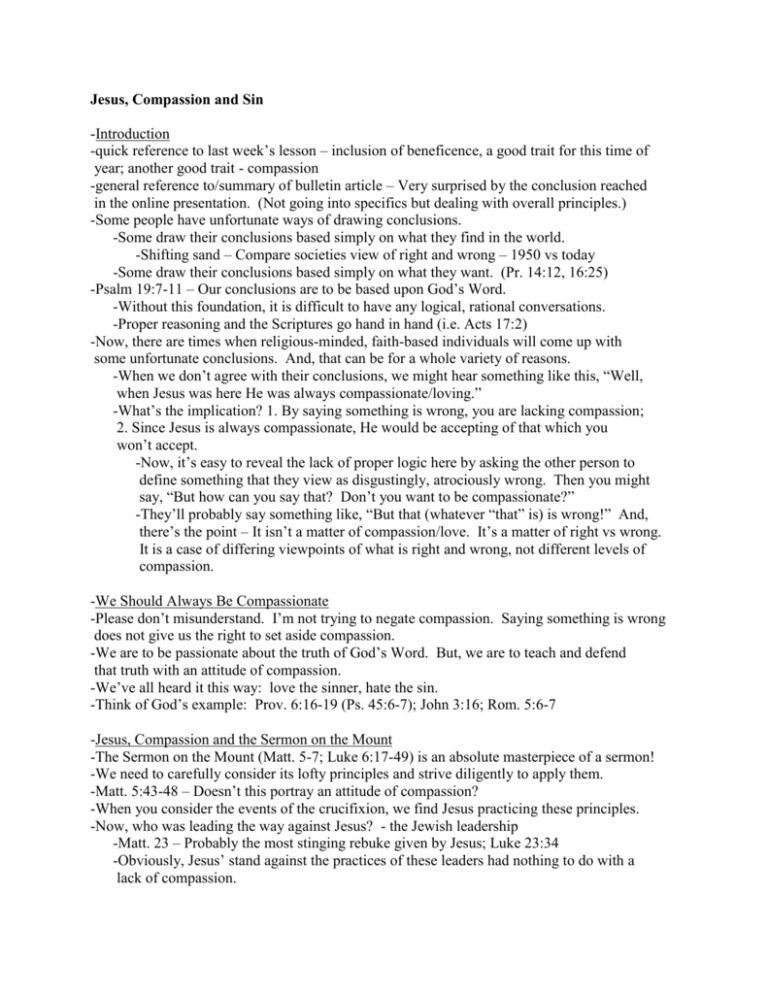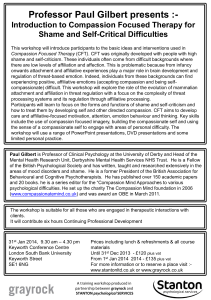Jesus, Compassion and Sin
advertisement

Jesus, Compassion and Sin -Introduction -quick reference to last week’s lesson – inclusion of beneficence, a good trait for this time of year; another good trait - compassion -general reference to/summary of bulletin article – Very surprised by the conclusion reached in the online presentation. (Not going into specifics but dealing with overall principles.) -Some people have unfortunate ways of drawing conclusions. -Some draw their conclusions based simply on what they find in the world. -Shifting sand – Compare societies view of right and wrong – 1950 vs today -Some draw their conclusions based simply on what they want. (Pr. 14:12, 16:25) -Psalm 19:7-11 – Our conclusions are to be based upon God’s Word. -Without this foundation, it is difficult to have any logical, rational conversations. -Proper reasoning and the Scriptures go hand in hand (i.e. Acts 17:2) -Now, there are times when religious-minded, faith-based individuals will come up with some unfortunate conclusions. And, that can be for a whole variety of reasons. -When we don’t agree with their conclusions, we might hear something like this, “Well, when Jesus was here He was always compassionate/loving.” -What’s the implication? 1. By saying something is wrong, you are lacking compassion; 2. Since Jesus is always compassionate, He would be accepting of that which you won’t accept. -Now, it’s easy to reveal the lack of proper logic here by asking the other person to define something that they view as disgustingly, atrociously wrong. Then you might say, “But how can you say that? Don’t you want to be compassionate?” -They’ll probably say something like, “But that (whatever “that” is) is wrong!” And, there’s the point – It isn’t a matter of compassion/love. It’s a matter of right vs wrong. It is a case of differing viewpoints of what is right and wrong, not different levels of compassion. -We Should Always Be Compassionate -Please don’t misunderstand. I’m not trying to negate compassion. Saying something is wrong does not give us the right to set aside compassion. -We are to be passionate about the truth of God’s Word. But, we are to teach and defend that truth with an attitude of compassion. -We’ve all heard it this way: love the sinner, hate the sin. -Think of God’s example: Prov. 6:16-19 (Ps. 45:6-7); John 3:16; Rom. 5:6-7 -Jesus, Compassion and the Sermon on the Mount -The Sermon on the Mount (Matt. 5-7; Luke 6:17-49) is an absolute masterpiece of a sermon! -We need to carefully consider its lofty principles and strive diligently to apply them. -Matt. 5:43-48 – Doesn’t this portray an attitude of compassion? -When you consider the events of the crucifixion, we find Jesus practicing these principles. -Now, who was leading the way against Jesus? - the Jewish leadership -Matt. 23 – Probably the most stinging rebuke given by Jesus; Luke 23:34 -Obviously, Jesus’ stand against the practices of these leaders had nothing to do with a lack of compassion. -Jesus and the Rich Young Ruler -Luke 18:18-24 -Of course, Jesus knew the heart of this man and the things that served as obstacles. -vs 23-24 – sadness -Mark 10:21 specifically states Jesus “loved [agapao] him.” -Closing and Invitation -How would Jesus address certain topics and situations today? Mal. 3:6 – the way He did when He was here before -according to the Word – John 12:47-50 -John 14:16, 26; John 16:12-15; 2 Tim. 3:16-17 -So, yes, we can take a stand against error without sacrificing compassion. That’s what Jesus did. -Invitation Joplin – December 9, 2012 – a.m.









